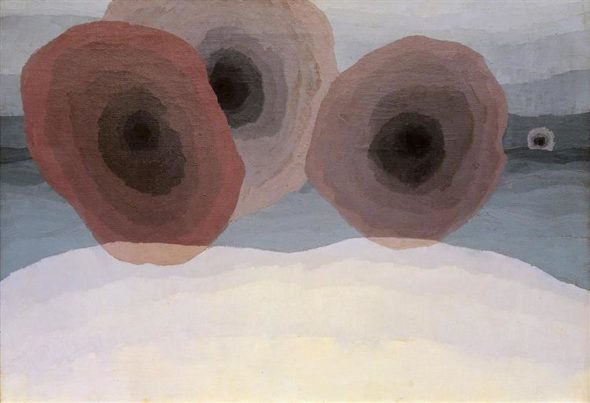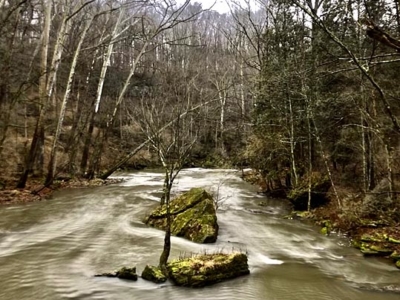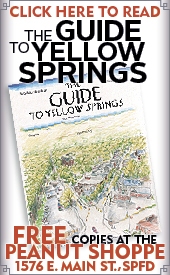

"Foghorns," Arthur Dove, 1929. (Via Wikiart.org)
First Lines — New moves: a poetry column
- Published: December 5, 2018
Poet William Stafford visited Yellow Springs in 1984 to read at First Presbyterian. One can imagine that the pacifist poet, raised a Quaker, drew an eager audience here; the News marked the occasion by publishing three of his works. Stafford, a giant of American poetry, is widely loved for his quiet wisdom and plain speech. Less noticed, perhaps, is his strangeness. His perception always tips toward the strange — as life itself does. His poems perpetually unsettle the ordinary, not in an anxious or neurotic way, but in a very calm, even sly manner. Here’s the last stanza from one poem, “Smoke”:
Smoke never doubts though:
some new move will appear.
Wherever you are, there is another door.
“Some new move will appear.” That is a faith to live by, I think. Life is full of “new moves.” And this poem is, too. Smoke is an unusual and risky image to offer as model and comfort for living. Yet Stafford makes it work by using the phrase “new move.” Simple words, yet a bold stroke, suggesting life’s ingenuity and deftness, even playfulness. And calling us to the game.
The News is happy to announce its own new move. We are launching a monthly poetry column, titled “First Lines.” Each month, we’ll publish a poem written by a local poet. We know Yellow Springs is a community of poetry lovers. As well as being home to numerous poets, the village hosts several poetry groups, the annual Winter Solstice poetry reading (this year on Friday, Dec. 7, at 7 p.m. — mark your calendars!) and, since 1993, Conrad’s Corner on WYSO, a poetry program featuring many area poets. The News hopes to enrich and enlarge this circle with regular contributions of work from poets in our village and region. Please see submission details below.
Why poetry? To answer this question, I turn to another Stafford poem, “Ask Me.” The poem opens:
Some time when the river is ice ask me
mistakes I have made. Ask me whether
what I have done is my life.
“Ask me whether / what I have done is my life.” So much is packed into those lines! Is it possible that “what I have done” is not “my life”? A lesser poet, or a less wise man, might fall into a reverie of self-pity at the thought. (Oh, how I’ve wasted my life!) Stafford knows better. A portion of the poem’s next stanza directs our attention to the current below the frozen river’s surface:
You and I can turn and look
at the silent river and wait. We know
the current is there, hidden; and there
are comings and goings from miles away
that hold the stillness exactly before us.
Here, the poem notes a fruitful tension between what is moving and what is, or appears, still. For the “stillness,” held “exactly before us,” in fact comes from “miles away.” Stillness is merely how the river looks. The hidden current is its (and our) real life.
Of course, one could think and say much more about these lines. You might read them in different ways. As might I, on a different day! The flexibility of that is glorious. Reading a poem, we are not looking to discover or decipher “what it means.” Rather, we are looking for the feeling of meaning — for how a poem brushes up against us, or how it touches off certain associations or reverberations inside us.
Poems lead us simultaneously into the mind of the poet and into our own minds, in both cases calling us down to the current we all carry below the surface. To permit this, we have to read poems with a loose grip and an open heart. We have to listen with the part of ourselves that might listen for certain birds in early spring, or for the best part of our favorite song. We must be alert yet relaxed, filled with anticipatory pleasure for what we’re about to hear.
What’s the value of this? Well, pleasure, for one! The deep pleasure of listening. Related to that is intimacy. Reading a poem, we come into closer contact with another person’s humanity, and with our own. Poet Donald Hall called a poem “a human inside talking to a human inside.” When was the last time you talked in that way? Listened in that way, to others and yourself?
Reading poems is one of the best ways I know to defy — to truly, radically defy — the social, economic and political forces that seek to alienate us from others, beginning by alienating us from ourselves. Poems are small but mighty. They expand, potentially endlessly, inside the mind and heart of a reader. They are slow in a culture that insists on fast. They are deep in a culture that insists on shallow. And they are human in a culture that insists on consumer, avatar, number, machine — anything but the gloriously, adequately human.
With these thoughts in mind, the News hopes to hear from many of you — those who love and write poetry.
________________________
Submission details
Individual writers may submit up to four poems in a given month. Poems should be 25 lines or fewer. Whole poems are preferred, but engaging excerpts of this length may be considered. Due to copyright considerations, please do not submit work that has been previously published; self-published poems are welcome.
Submissions are accepted on a rolling basis. One poem will be published each month, in the print edition of the News and online at the News website.
Submit poems as Word attachments by email to: ahackett@ysnews.com. Include your name, address, daytime phone number and a short bio. All submissions will be briefly acknowledged; only those writers whose work is being considered for publication will be contacted for further discussion. Selected writers will receive a small honorarium for their published poem.
All News readers, including those who live outside of Yellow Springs, are welcome to submit poems.
Selection of works will be made primarily by the poetry editor. (That’s me, Audrey Hackett.) I will be using four main criteria to guide selections. Does the poem engage the imagination? Does the poem stimulate and transmit feeling? Does the poem use fresh or intensified language? (A poem may use very simple language, but use it in ways that press against what readers expect language to do.) And, fourth, over the course of a year, do the poems published reflect the village’s diverse inhabitants and perspectives?
We look forward to your poems!
*Updated Jan. 10, 2020: A poet and reporter for the News, Audrey Hackett holds an MFA in poetry from Vermont College of Fine Arts. Her favorite poets include Pablo Neruda, Antonio Machado, Jean Valentine, Tomas Tranströmer, Jean Follain, Jane Kenyon and William Stafford. The Stafford poems quoted in this column can be found in “Ask Me,” a collection edited by the poet’s son, Kim Stafford; the collection is available at Yellow Springs Community Library.
To read other First Lines poetry columns, visit the archive page here.
The Yellow Springs News encourages respectful discussion of this article.
You must login to post a comment.
Don't have a login? Register for a free YSNews.com account.
Parkinsons.jpg)














No comments yet for this article.